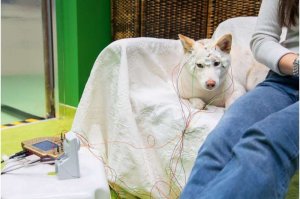New study provides neural evidence that dogs visualise words as humans do
 People have long wished to talk to animals and this desire is reflected in cultural objects such as Arthur C. Clarke's novel Dolphin Island. One well-known example of an animal "learning" human language was the horse Clever Hans, who was later shown to be responding to cues from his handler rather than actually understanding. Cases of poorly-controlled claims, like Clever Hans, and speciest notions of human uniqueness have hindered development of the field. However, the wish to communicate through language has remained and many animals have been claimed to use or understand human languages, including dogs.
People have long wished to talk to animals and this desire is reflected in cultural objects such as Arthur C. Clarke's novel Dolphin Island. One well-known example of an animal "learning" human language was the horse Clever Hans, who was later shown to be responding to cues from his handler rather than actually understanding. Cases of poorly-controlled claims, like Clever Hans, and speciest notions of human uniqueness have hindered development of the field. However, the wish to communicate through language has remained and many animals have been claimed to use or understand human languages, including dogs.
The most notable example of dogs understanding human language was the border collie Chaser (April 28, 2004 – July 23, 2019). She was raised by behaviour psychologist John W. Pilley and became famous for learning the names of over 1000 individual toys (study). Her language skills were not limited to rote memorisation; she displayed an understanding of sentence structure (e.g. take X to Y) even when the objects were in different rooms and had never previously been used in such constructions (study). Chaser was also able to infer the name of an unknown toy in a group of known toys, as was demonstrated in an interaction with astrophysicist Neil deGrasse Tyson.
Canine use of human language has become more mainstream with tools such as the FluentPet buttons. These buttons use sounds and pictures to represent specific words. The idea is that it can allow dogs and their guardians to communicate more clearly. The effectiveness of the buttons has not yet been scientifically assessed but researchers from the University of California San Diego, in the US, are trying to evaluate them. On the other side of the Atlantic, ethologists from the Eötvös Loránd University, in Hungary, have been studying gifted word learner dogs, those with a greatly increased ability to learn new words (study). However, these studies assess language use and understanding at a behavioural level; it remains unclear what is happening inside the dog's mind.
The latest study from the Eötvös Loránd University team addresses this gap. Using non-invasive electroencephalography (EEG), the team was able to monitor the brain activity of 18 dogs as their guardians said the names of different toys and then showed them either the correct or incorrect toy. The researchers reasoned that, if the dog had a mental representation of the object, then seeing either the correct or incorrect object would lead to a measurable difference in brain activity. This is exactly what they found (study).
The EEG results were considered analogous to the N400 response in humans, widely taken as evidence that the person understands the word well enough to form a mental image of it. This suggests that dogs do not merely respond to human language in a conditioned way but posses a mental representation of the meaning of words. The combination of dogs showing a vocabulary of nouns with mental representation as well as understanding of grammar, suggests that some dogs posses a greater understanding human language than is generally appreciated.
Studies:
- Pilley, John W, and Alliston K Reid. ‘Border Collie Comprehends Object Names as Verbal Referents.’ Behavioural Processes 86, no. 2 (February 2011): 184–95. https://doi.org/10.1016/j.beproc.2010.11.007.
- Pilley, John W. ‘Border Collie Comprehends Sentences Containing a Prepositional Object, Verb, and Direct Object’. Learning and Motivation 44, no. 4 (November 2013): 229–40. https://doi.org/10.1016/j.lmot.2013.02.003.
- Dror, Shany, Ádám Miklósi, Andrea Sommese, and Claudia Fugazza. ‘A Citizen Science Model Turns Anecdotes into Evidence by Revealing Similar Characteristics among Gifted Word Learner Dogs’. Scientific Reports 13, no. 1 (14 December 2023): 21747. https://doi.org/10.1038/s41598-023-47864-5.
- Boros, Marianna, Lilla Magyari, Boglárka Morvai, Raúl Hernández-Pérez, Shany Dror, and Attila Andics. ‘Neural Evidence for Referential Understanding of Object Words in Dogs’. Current Biology, March 2024, S0960982224001714. https://doi.org/10.1016/j.cub.2024.02.029.

About the author
Rakuen Growlithe — read stories — contact (login required)a scientist and Growlithe, interested in science, writing, pokemon and gaming
I'm a South African fur, originally from Cape Town, who spends most of his time in Europe. I'm interested in all sorts of things, particularly science, furry and some naughtier things too!
Comments
Fascinating study! I'm sure dogs wonder why we humans aren't better at understanding their language, that "wuf" means "in," "woof" means "out," "weuf" means "Feed me," while "wuuuf" means "I have an itch behind my ear, please scratch it."
Right now I have to go let my dog in, because she is saying "Wuf-woof-woof-weuf-wuff!" which means, "Get off your fat, lazy ass and open the door, you damned monkey!"
None of this means you can fuck them, sorry Rakuen
Well... that was incredibly rude and mean-spirited.
I hope it was worth it, because Santa Claus won't be bringing you that Super Nintendo you wanted next year.
Doesn't mean they'll not try
Now if we could only teach them to read.
Wait, I got an idea...
Make them watch old re-runs of Wishbone and Martha Speaks!
And you only realised this now?
So what do you think they experience in their minds when you take them from behind?
Them poor dogs (and cats, rabbits, ferrets, and even dolphins)
we should perform animal testing exclusively on democrats
Post new comment